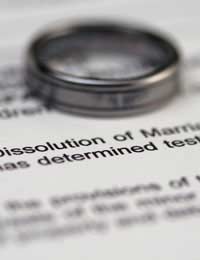Asset Protection and Divorce

There is a huge variety of potential reasons for the establishment of an asset protection trust. Many high-worth individuals establish this type of trust with the intention of shielding their assets from tax liabilities, or from the effects of litigation. Similarly, some perhaps less scrupulous individuals choose to settle assets in an asset protection trust with the intention of providing some defence from an attack by creditors. However, a frequently overlooked purpose for such a trust is the protection of assets from claims made during divorce proceedings.
Divorce can be a very costly process, particularly for those with very valuable asset portfolios. One need only look at some of the more high profile divorce cases in recent years (the McCartney-Mills case immediately springs to mind) for evidence of the potential expense.
In most cases, marriages begin in a climate of trust; both parties agree to share their lives together, and this almost exclusively includes their possessions. However, it is becoming more and more common for marriages to fail; indeed, the divorce rate seems to tend inexorably upward. A concurrent problem is the precarious nature of family assets. After the failure of a marriage, both parties will inevitably feel that they have some claim to the assets that had been enjoyed by the couple or the family. The settlement of these disputes can have unexpectedly costly consequences.
Miller And McFarlane
The complexities of divorce law, with particular reference to the treatment of family assets, has recently been brought into stark relief by the cases of Miller and McFarlane. House of Lords adjudications in these cases has fuelled uncertainty regarding the treatment of these assets. In both of these cases, estranged wives successfully appealed against rulings limiting their husbands' continuing financial liabilities.In the Miller case the Lords ruled that maintenance payments to the complainant could theoretically continue in perpetuity, while the McFarlane case upheld the wife's large financial claim against her previous husband. The latter case was particularly surprising; the wife was awarded £5million even though the marriage lasted only two and a half years. Importantly, the appreciation in value of assets acquired by the husband before the marriage was taken into account.
Alternatives
The uncertainty generated by these cases has resulted in new guidance being offered by asset protection professionals. It is now presumed that a trust established in apprehension of the failure of a marriage is likely to fail.Indeed, any trust that makes provision for the protection of assets against claims made as a result of divorce proceedings is vulnerable, unless the trust was established significantly in advance of the marriage.
Furthermore, assets that have been acquired before the marriage may form part of a divorce settlement, although the extent to which this principle applies will depend on the length of the marriage. As such, an asset protection trust is frequently unsuitable for these purposes. In this way, family trust lawyers have been forced to look at other means by which individuals can protect their assets in a divorce situation.
Amongst the most popular and effective alternatives is a prenuptial agreement. This is particularly useful for those who already have significant asset portfolios, or for couples for whom there is a large discrepancy in financial value. However, it should be remembered that each party will be required to make a full and frank disclosure regarding all of their assets in order for the agreement to be deemed valid.
In basic terms, asset protection trusts are generally no longer deemed suitable for those who wish to protect assets against a potential divorce settlement. In these cases, individuals should look at other instruments to safeguard their wealth.


Re: Avoidance of Probate
Hi, the wife and i are thinking of doing a joint will. to leave our assets to one another, to who ever passes first. I take it is…
Re: How to Trace Whereabouts of Trust Funds?
I was involved in a car accident when I was younger and I’m now 18 and I was awarded £3,000 and my parents cannot…
Re: How to Trace Whereabouts of Trust Funds?
I’m trying to locate details of a trust fund which was left by my younger brother with my parents being the…
Re: Revocable and Irrevocable Trusts
I have trust but my step brother went behind my dad back and change the final trust. Now he refuses to tell us if the trust…
Re: How to Trace Whereabouts of Trust Funds?
Hi I am looking for a trust fund,that I think my dad left is half of the house in ,my step mother didn't go into…
Re: Can Conditions Be Put Into Adult Children's Trust Funds?
Hi, can you help. my father was killed in a road accident in October 1966. My grandfather…
Re: Reasons for Establishing a Living Trust
are there any inheritance tax ramifications when creating a 'living trust'.
Re: What is Absolute Entitlement?
My mother’s will has the word absolutely after each beneficiary name. My sister has died since but the estate has been delayed…
Re: Implied and Express Trusts
My father (ZML) and stepmother (JNL) wrote joint wills which each contained a testamentary trust. I was named executor and trustee.…
Re: How to Trace Whereabouts of Trust Funds?
Hello i am trying to locate a trust that i think my mother is hiding from me